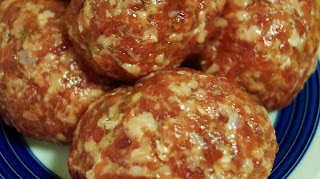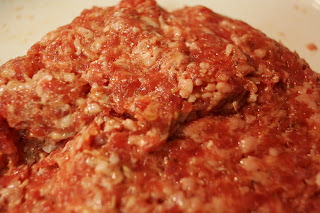So, it's day one of "Brave" week! Who's excited?
The first recipe I wanted to do this week was, honestly, the one I was looking forward to the most. Though I apologize... Despite the name, this dish isn't actually truly Scottish in origin. It was invented in London at a department store, though it may have been a variation of either an Indian or African dish. So why is it called Scotch or Scottish eggs? The best that I can discover from all of 5 minutes of research is that either it refers to the process of cooking them, because the original recipe called for Scotch beef, or because it was a very posh dish originally served as a robust accompaniment to liquor back when it was created in the 1700's.
Regardless, these are amazingly good and they are something of a Rose and Crown signature appetizer and one of my favorite, favorite pub foods. I'm hoping that and the fact that they're apparently more popular in Scotland then England will kind of excuse my choice to include them this week. Plus, they're super good and taste exactly as they're served at Rose and Crown.
 Making these is really not as hard as it seems, though there are many steps in the process. The biggest tips I can offer to having these turn out really, really well is to make sure the oil is hot and the egg starts frying as soon as you put it in. If the egg goes into cold oil, it'll be dripping in fat and you won't get that amazing, crunchy bread coating on the outside of the egg. Also, having made these before (with a different recipe), I made the choice to leave out the fresh parsley from the sausage mix. I find that it either burns, or it gets soggy and prevents the bread coating from being crunchy. When it comes to putting the sausage around the egg, avoid the mistake I always make... Don't use too much sausage. It'll draw out the cooking process and by the time the sausage is cooked through, the breading is burned. Should you cut into an egg and find that the sausage is still raw, wrap it in foil and put it in a warm oven. The sausage will cook until done without drying the egg. No harm done. Believe it or not, the hardest part of this recipe for me is always the hard boiled eggs. I stink at making and peeling hard boiled eggs, though luckily, it doesn't matter once you wrap them in the sausage.
Making these is really not as hard as it seems, though there are many steps in the process. The biggest tips I can offer to having these turn out really, really well is to make sure the oil is hot and the egg starts frying as soon as you put it in. If the egg goes into cold oil, it'll be dripping in fat and you won't get that amazing, crunchy bread coating on the outside of the egg. Also, having made these before (with a different recipe), I made the choice to leave out the fresh parsley from the sausage mix. I find that it either burns, or it gets soggy and prevents the bread coating from being crunchy. When it comes to putting the sausage around the egg, avoid the mistake I always make... Don't use too much sausage. It'll draw out the cooking process and by the time the sausage is cooked through, the breading is burned. Should you cut into an egg and find that the sausage is still raw, wrap it in foil and put it in a warm oven. The sausage will cook until done without drying the egg. No harm done. Believe it or not, the hardest part of this recipe for me is always the hard boiled eggs. I stink at making and peeling hard boiled eggs, though luckily, it doesn't matter once you wrap them in the sausage.Here's a quick video for how I wrap the eggs. It really is quite easy, especially if your sausage is nice and moist.
Serve these warm or cold, whole or sliced in a salad, dry or with mustard, A1, or the sauce below, which is also the sauce they serve there (sorry, I chose not to make it because we never eat it and really don't like mayo).
~~~~ °o° ~~~~
Scotch Eggs
As is served at Rose and Crown Pub and Dining Room, England Pavilion, EPCOT
°o° 1/2 teaspoon rubbed sage
°o° 1/2 teaspoon thyme, ground
°o° 8 eggs, hard-boiled and peeled
°o° 3/4 cup flour
°o° 1/2 teaspoon salt
°o° Pepper, freshly ground
°o° 2 eggs, lightly beaten
°o° 1 cup bread crumbs
°o° Oil for frying
 Mix sausage with parsley, sage, and thyme. Wrap around eggs by making sausage patties and shaping around the hard-boiled egg, making sure the egg is completely covered.
Mix sausage with parsley, sage, and thyme. Wrap around eggs by making sausage patties and shaping around the hard-boiled egg, making sure the egg is completely covered.Combine salt, pepper, and flour. Dredge sausage-wrapped egg in flour, then roll in the egg wash, and finally roll in the bread crumbs, making sure the sausage is totally covered. Deep fry until golden brown (and sausage is cooked), about 5 minutes, in hot oil. Remove from oil and pat on paper towels.
For mustard sauce, combine 2 cups mayonnaise, 1/4 cup white chablis, 2 teaspoons dry mustard, 1 1/2 teaspoons old English-style mustard, salt to taste, 1/2 teaspoon Worcestershire sauce, 1/8 teaspoon cayenne pepper, and 1 tablespoon fresh lemon juice, and stir lightly to blend. Chill.
~~~~ °o° ~~~~





































0 comments:
Post a Comment